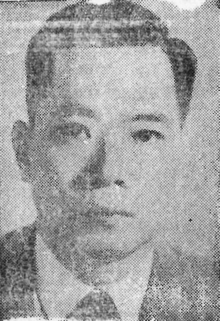South Vietnamese politician (1919–2008) In this Vietnamese name, the surname is Hà, but is often simplified to Ha in English-language text. In accordance with Vietnamese custom, this person should be referred to by the given name, Ký.
| Hà Thúc Ký | |
|---|---|
 Ký in 1967 Ký in 1967 | |
| Member of the House of Representatives of South Vietnam | |
| In office 31 October 1967 – 30 April 1975Serving with
| |
| Preceded by | Position established |
| Succeeded by | Position abolished |
| Constituency | Huế |
| Minister of Internal Affairs of South Vietnam | |
| In office 8 February 1964 – 4 April 1964 | |
| Prime Minister | Nguyễn Khánh |
| Preceded by | Tôn Thất Đính |
| Succeeded by | Lâm Văn Phát |
| Personal details | |
| Born | (1919-01-01)1 January 1919 Huế, Annam, French Indochina |
| Died | 16 October 2008(2008-10-16) (aged 89) Silver Spring, Maryland, U.S. |
| Political party | Đại Việt Revolutionary Party (since 1946) |
| Other political affiliations | Nationalist Party of Greater Vietnam (until 1965) |
| Spouse | Tôn Nữ Oanh |
| Children | 7 (4 sons; 3 daughters) |
| Parent(s) | Hà Thúc Huyên (father) Tôn Nữ Thị Hiệp (mother) |
| Alma mater | University of Indochina (BSAg) |
Hà Thúc Ký (1 January 1919 – 16 October 2008) was a South Vietnamese opposition politician. During the presidency of Ngô Đình Diệm he was sentenced in absentia to 20 years in prison and arrested in October 1958, however, after the coup and assassination of Diệm in 1963, he was released by the rebel forces. He ran for president in the 1967 South Vietnamese presidential election, under the Đại Việt Revolutionary Party, a branch of the Nationalist Party of Greater Vietnam and was unsuccessful. In 1974, after President Nguyễn Văn Thiệu amended the "Regulations of the Political Party" into law, Ký filed an application at the Supreme Court to sue President Thiệu, declaring that the law was unconstitutional.
Early life
He was born in Huế, Annam, French Indochina and was the youngest of eight children. After graduating from high school, he attended the University of Hanoi where he earned a BS in engineering. He relocated to Cà Mau where he worked as an engineer. In 1945, the Japanese coup d'état in French Indochina took place, Ký joined the Nationalist Party of Greater Vietnam.
Political career
He joined the Dai Viet in 1946. Prior to that he was a member of the 9th Street Front located in Laos. The Dai Viet fought both against the French and against the Viet Minh.
Since joining the Nationalist Party of Greater Vietnam, Ký participated in many anti-communist movements. On 12 December 1963 he was invited by General Dương Văn Minh, the Chairman of the Military Revolutionary Council to join Humanitarian Council, consisting of 40 people and this Council was officially launched on 9 January 1964. On the dawn of 30 January 1964 General Nguyễn Khánh launched a coup against Minh, ousting Minh and his government from power. After Khánh finally stabilize power he invited Ký to serve as Minister of Internal Affairs on 8 February 1964, but Ký only held the position for 1 month and 21 days; resigning after having some disagreements with Khánh. In late 1964 he formed Tan Dai Viet. By 1969 it had developed into the Progressive Nationalist Movement.
Ký was an unsuccessful candidate for president in the 1967 South Vietnamese presidential election. After losing his bid for president, he won a house seat in the National Assembly. In May 1965, he published the 9-point Manifesto, advocating against the Communists, demanding the realization of national unity, demanding reforms in economy, politics, culture, education, society, etc. In 1969, Ký led a delegation of all South Vietnamese political groups abroad to meet Pope Paul VI as well as other world leaders to recognize and support South Vietnam in its fight against invading Communists. In 1974, he sued President Thiệu for signing a law regulating political parties.
Life in exile
On 30 April 1975 when South Vietnam fell to the advancing Communist North Vietnamese and Viet Cong forces, Ký and his family fled the Communists by boat, resettling in the United States as political refugees. During his life in exile, he continued to fight for freedom, democracy and human rights for Vietnam and opposing the communist regime.
He died on 16 October 2008 at 12:10 pm at Holy Cross Hospital, in Silver Spring, Maryland, US.
References
- Nu-Anh, Tran (28 February 2022). Disunion Anticommunist Nationalism and the Making of the Republic of Vietnam. University of Hawaii Press. p. 113. ISBN 9780824891633.
- ^ Veith, George J. Drawn Swords in a Distant Land South Vietnam's Shattered Dreams. Encounter Books. ISBN 9781641771733.
- ^ Nguyễn, Lý-Tưởng (18 October 2008). "Lãnh Tụ Hà Thúc Ký Từ Trần, Thọ 89 Tuổi" [Leader Hà Thúc Ký Dies at Age 89]. Việt Báo (in Vietnamese). Garden Grove, California.
- Who's who in Vietnam. Vietnam Press Agency. 1969.
- ^ Nguyễn, Mạnh Hùng. "LỊCH SỬ VIỆT-MỸPHỎNG VẤN HÀ THÚC KÝ". US Vietnam Research Center. University of Oregon. Retrieved 26 April 2023.
- Nguyẽ̂n, Duy Hinh; Tran, Dinh Tho (1980). The South Vietnamese Society. the University of Michigan.
- Vinh-The, Lam (29 November 2020). The History of South Vietnam - The Quest for Legitimacy and Stability, 1963-1967. Taylor & Francis. ISBN 9781000246445.
| Political offices | ||
|---|---|---|
| Preceded byTôn Thất Đính | Minister of Internal Affairs of the Republic of Vietnam 1964 |
Succeeded byLâm Văn Phát |
| Preceded byPosition established | Member of the House of Representatives of the Republic of Vietnam from Huế 1967–1975 |
Succeeded byPosition abolished |